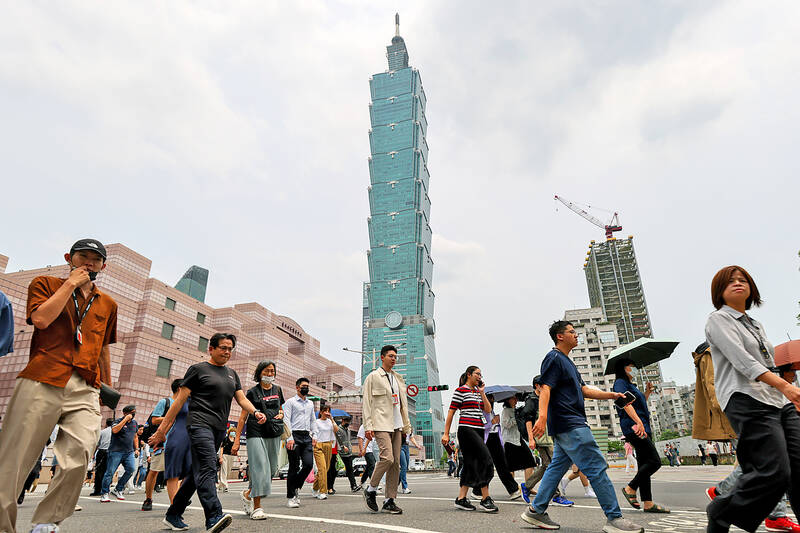Taiwan remained the fifth-largest net creditor last year as its net international investment position (NIIP) hit another new high, the central bank said on Friday.
Taiwan’s external financial assets totaled US$2.91 trillion at the end of last year, up US$247.04 billion, or 9.3 percent, from a year earlier, while the nation’s external financial liabilities reached US$1.17 trillion, up US$183.12 billion, or 18.5 percent, from a year earlier, data compiled by the central bank showed.
The difference between Taiwan’s external financial assets and liabilities hit a new high of US$1.74 trillion, up US$63.92 billion, or 3.8 percent, from a year earlier, positioning the nation as the world’s fifth-largest net creditor, the data showed.

Photo: EPA-EFE
The NIIP is the difference between a country’s external financial assets and its external financial liabilities, the central bank said.
Japan took the top net creditor spot with a NIIP of about US$3.44 trillion last year, followed by Germany (US$3.20 trillion), China (US$2.19 trillion) and Hong Kong (US$1.78 trillion), the central bank said.
The rise in Taiwan’s external financial assets last year stemmed partly from a boom in global stock markets, which pushed up sharply the value of overseas shares held by investors in Taiwan, it said.
Stock markets worldwide rose about 17 percent last year, helping Taiwan’s portfolio investments rise 14.1 percent from a year earlier to US$1.39 trillion, it said.
The nation’s cumulative outbound investments also hit a new high of US$500.14 billion last year, up 10.9 percent from a year earlier, as restructuring of global supply chains led many Taiwanese companies to send more of their funds overseas, it said.
The central bank was referring to companies such as contract chipmaker Taiwan Semiconductor Manufacturing Co (台積電), which has poured funds into the US, Japan and Germany to build advanced wafer fabs to diversify its production bases.
Taiwan has long maintained a surplus in its current account, which mainly measures the exports and imports of a country’s merchandise and services.
The other big creditors, Japan, Germany and China, have also traditionally been net exporters, though Japan has recorded trade deficits over the past few years.
At the end of last year, Taiwan’s current account hit US$105.33 billion, up from US$100.93 billion as of the end of 2022, the central bank data showed.
External financial liabilities were boosted by cumulative foreign direct investment in Taiwan, which reached a new high of US$136.6 billion last year, up 9.8 percent from a year earlier.
In addition, total portfolio investments in Taiwan by overseas investors were up 33.5 percent from a year earlier to US$710.9 billion, the central bank said.
The higher portfolio numbers reflected, in part, the 26.8 percent rise in the TAIEX last year, it said.

UNCERTAINTY: Innolux activated a stringent supply chain management mechanism, as it did during the COVID-19 pandemic, to ensure optimal inventory levels for customers Flat-panel display makers AUO Corp (友達) and Innolux Corp (群創) yesterday said that about 12 to 20 percent of their display business is at risk of potential US tariffs and that they would relocate production or shipment destinations to mitigate the levies’ effects. US tariffs would have a direct impact of US$200 million on AUO’s revenue, company chairman Paul Peng (彭雙浪) told reporters on the sidelines of the Touch Taiwan trade show in Taipei yesterday. That would make up about 12 percent of the company’s overall revenue. To cope with the tariff uncertainty, AUO plans to allocate its production to manufacturing facilities in

TAKING STOCK: A Taiwanese cookware firm in Vietnam urged customers to assess inventory or place orders early so shipments can reach the US while tariffs are paused Taiwanese businesses in Vietnam are exploring alternatives after the White House imposed a 46 percent import duty on Vietnamese goods, following US President Donald Trump’s announcement of “reciprocal” tariffs on the US’ trading partners. Lo Shih-liang (羅世良), chairman of Brico Industry Co (裕茂工業), a Taiwanese company that manufactures cast iron cookware and stove components in Vietnam, said that more than 40 percent of his business was tied to the US market, describing the constant US policy shifts as an emotional roller coaster. “I work during the day and stay up all night watching the news. I’ve been following US news until 3am

Taiwan will prioritize the development of silicon photonics by taking advantage of its strength in the semiconductor industry to build another shield to protect the local economy, National Development Council (NDC) Minister Paul Liu (劉鏡清) said yesterday. Speaking at a meeting of the legislature’s Economics Committee, Liu said Taiwan already has the artificial intelligence (AI) industry as a shield, after the semiconductor industry, to safeguard the country, and is looking at new unique fields to build more economic shields. While Taiwan will further strengthen its existing shields, over the longer term, the country is determined to focus on such potential segments as

COLLABORATION: Given Taiwan’s key position in global supply chains, the US firm is discussing strategies with local partners and clients to deal with global uncertainties Advanced Micro Devices Inc (AMD) yesterday said it is meeting with local ecosystem partners, including Taiwan Semiconductor Manufacturing Co (TSMC, 台積電), to discuss strategies, including long-term manufacturing, to navigate uncertainties such as US tariffs, as Taiwan occupies an important position in global supply chains. AMD chief executive officer Lisa Su (蘇姿丰) told reporters that Taiwan is an important part of the chip designer’s ecosystem and she is discussing with partners and customers in Taiwan to forge strong collaborations on different areas during this critical period. AMD has just become the first artificial-intelligence (AI) server chip customer of TSMC to utilize its advanced